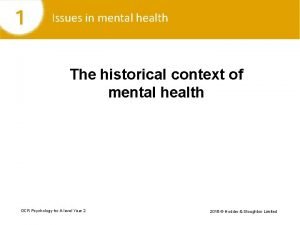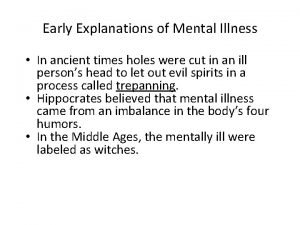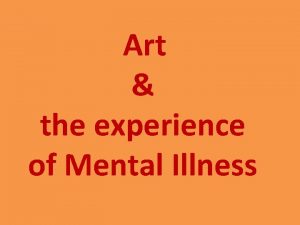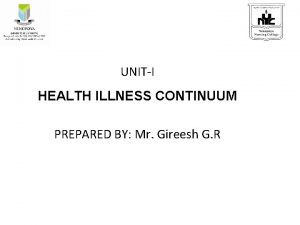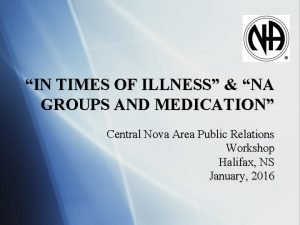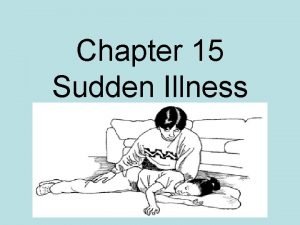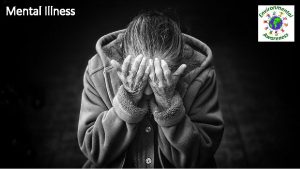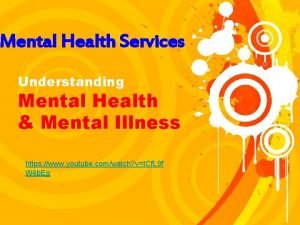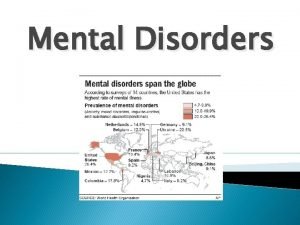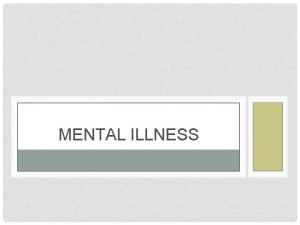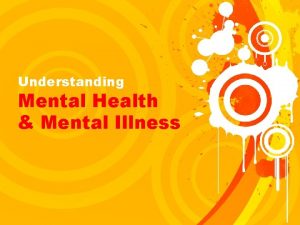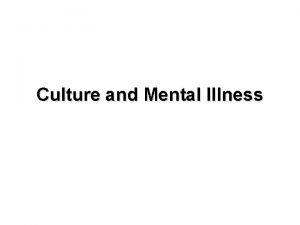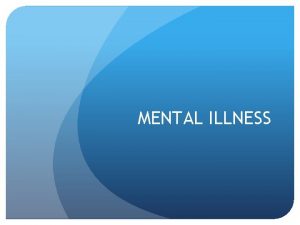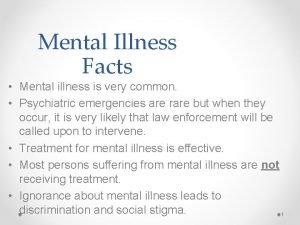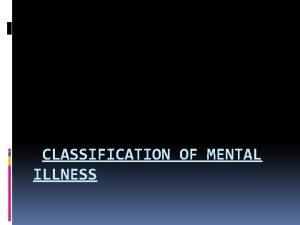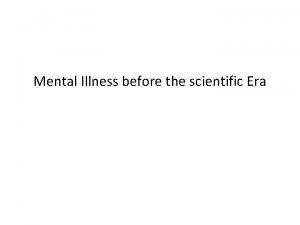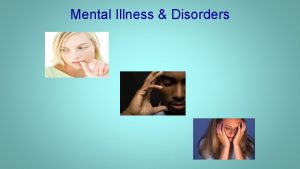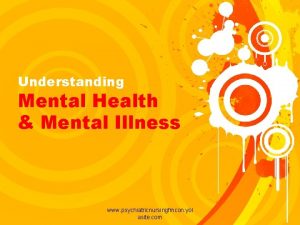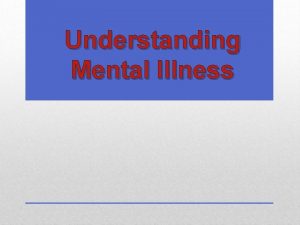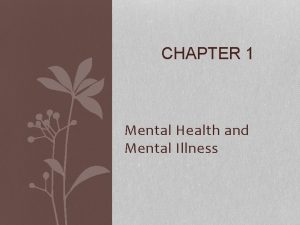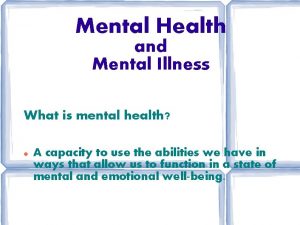Understanding Mental Health Mental Illness What is Mental

































- Slides: 33

Understanding Mental Health & Mental Illness

What is Mental Health? ? Mental health refers to the maintenance of successful mental activity. This includes maintaining productive daily activities and maintaining fulfilling relationships with others. It also includes maintaining the abilities to adapt to change and to cope with stresses.

• Mental health and mental illness are complicated terms, partly because there are lots of different causes of mental health issues and a whole range of different symptomsfor each one. There are some simple things that you can do to help look after your mental health.

• Generally speaking, our mental health refers to our state of mind and our ability to cope with the everyday things that are going on around us. Someone with ‘good’ mental health usually feels capable of dealing with the different everyday situations that they find themselves in. When we have a mental illness, this process is often a lot more difficult. • Mental illnesses are really common people between the ages of 14 -25 will experience mental illness.

• Keep in mind that this is a simplified definition of mental health and that it’s totally normal for everyone to have mental health issues - that is, to go through ups and downs. It is only when the difficulties start to hang ﺷﻨﻖ around for a while and it feels like nothing can make them go away that they may be considered a mental illness

• It is definitely NOT easy being a teenager! • Sometimes it’s tough to avoid feeling stressed, and pressure can build up in many areas of life (socially, in school, at home, and while making big life decisions)

• Worrying about these pressures is NORMAL. • But feeling VERY sad, hopeless or worthless might be a sign of a mental health problem.

Mental illness can occur when the brain (or part of the brain) is not working well or is working in the wrong way.

When the brain is not working properly, one or more of its 6 functions will be disrupted Behavior Thinking Perception Physical Emotion Signaling

Symptoms can include Thinking difficulties or problems focusing attention Extreme emotional highs and lows Sleep problems

When these symptoms significantly disrupt a person’s life, we say that the person has a mental disorder or a mental illness.

So, what are the CAUSES of mental illness? ?

Well, the causes of mental illness are COMPLICATED!! + Genetics → Environment Brain Disorder

What do we know about the causes of mental illness? The symptoms of mental illness are a result of abnormal brain functioning. Mental illness is a brain disorder. Mental illness is rarely if ever caused by stress alone

What do we know about the causes of mental illness? It is not the consequence of poor parenting or bad behavior. It is not the result of personal weakness or deficits in personality. It is not the manifestation of ﺍﻟﺤﻘﺪ malevolent spiritual intent. Only in exceptional cases is it caused by nutritional factors. It is not caused by poverty.

What causes mental illnesses? • Diagnosing a mental illness is no easy task as there a huge range of factors that need to be considered. It’s impossible to pinpoint the exact cause of a mental illness, and it’s often likely to be a combination of a few different things. Some of the things that may contribute to mental health issues are:

• Biological factors – mental illnesses can be passed on genetically from parents to their children. Hormones are another biological factor that can be responsible for changes in our mental health. • Early life events – traumatic events that happened when we were younger, such as neglect or abuse, can have a strong influence on our mental health later in life. • Recent life events – there are lots of events that can affect our mental health, such as persistent stress from study or work, or a traumatic event such as the loss of a loved one.

• Internal factors – mental illnesses can also be influenced by thoughts and feelings that come from inside of us, as opposed to from our surroundings. This can include things like our body image and self-esteem. • Misuse of drugs – drugs, including alcohol, have all sorts of different effects on our brain and the results are very unpredictable. One of the common effects of consuming too many drugs is a negative impact on our mental health.

Many mental illnesses begin during childhood and persist into adolescence. Some of these include: • Attention Deficit Hyperactivity Disorder (ADHD) • Autism Spectrum Disorders (ASD) • Generalized Anxiety Disorder (GAD

BUT… some illnesses begin during adolescence. The illnesses that most often begin during adolescence include: • • Major Depression (MD) Schizophrenia Bipolar Disorder (BD) Panic disorder Social Anxiety Disorder Eating Disorders Obsessive Compulsive Disorder Addictions

Common signs of mental illness • There are some things to look out for when it comes to detecting a mental illness. However, it’s also really important to remember that a lot of the tell-tale ﻋﻼﻣﺔ ﺇﻧﺬﺍﺭ signs of mental illnesses are just a part of life at some point or other for the vast majority of us. Some of the signs are:

• Loss of interest in activities that you normally enjoy doing • Feeling worried • Constantly being in a bad mood • Having trouble sleeping, or sleeping way more than usual • Crying for no apparent reason • Feeling ‘down’ • Lack of motivation

• Having trouble concentrating • Changes in eating habits • Having trouble performing at school or at work • Substance abuse • Having trouble coping with or participating in everyday activities

• If you’re experiencing any of these, it doesn’t necessarily mean that there is something serious going on, but it’s worth having a chat to someone you trust about it. If you have been experiencing many of these symptoms over a long period of time, it’s a good idea to chat to someone you trust and set up an appointment with your GP to talk it over.

What do we know about people with mental illnesses? • Most people with mental disorders live productive and positive lives while receiving treatments for their mental illness. • Some people have severe and persistent mental disorders which respond poorly to current treatments (as in all other illnesses) • Mental illness does not respect any boundaries of race, class or geography. • The majority of people have a friend, ﺍﻟﻤﻌﺮﻓﺔ acquaintance or family member who has or has had a mental disorder.

Mental health problems can be treated! If you feel VERY sad, stressed or worried, it might help to talk to someone about how you are feeling.

Do you ever… • • Often feel very angry or very worried? Do reckless ﺗﻬﻮﺭ things that could harm you or others? Feel grief for a long time after a loss or a death? Think your mind is controlled or out of control? Use alcohol or drugs? Exercise, diet and/or binge ﺣﻔﻠﺔ -eat obsessively? ﻫﻮﺍﺟﺲ Hurt other people or destroy property? ﻣﻤﺘﻠﻜﺎﺕ

Do you ever… • • Often feel very angry or very worried? Do reckless things that could harm you or others? Feel grief for a long time after a loss or a death? Think your mind is controlled or out of control? Use alcohol or drugs? Exercise, diet and/or binge-eat obsessively? Hurt other people or destroy property? If you feel any of these things, it might help to talk to a parent, teacher, school counselor or physician.

How to look after your mental health • Although mental illnesses are not always avoidable, there are some simple things that we can do all year round to look after our mental health:

• Exercise (it releases endorphins which can improve your mood) • Surround yourself with supportive people • Put aside some time every day to relax • Do the things that you enjoy doing • Stay in touch with your friends and family • Take advantage of technology. Reach. Out has several mobile apps that makes taking care of 'you' easier.

What do psychiatric-mental health nurses (PMHN) do? • Psychiatric mental health nursing is a specialty within nursing. Psychiatric mental health registered nurses work with individuals, families, groups, and communities, assessing their mental health needs. The PMHN develops a nursing diagnosis and plan of care, implements the nursing process, and evaluates it for effectiveness.

• . assess, diagnose, and treat individuals and families with psychiatric disorders or the potential for such disorders using their full scope of therapeutic skills, including the prescription of medication and administration of psychotherapy. • PMH often own private practices and corporations as well as consult with groups, communities, legislators, and corporations.

 Chapter 20 mental health and mental illness
Chapter 20 mental health and mental illness Mental health jeopardy questions and answers
Mental health jeopardy questions and answers Chapter 1 understanding health and wellness lesson 2
Chapter 1 understanding health and wellness lesson 2 Chapter 1 understanding health and wellness
Chapter 1 understanding health and wellness Historical views of mental illness psychology ocr
Historical views of mental illness psychology ocr Fair housing act mental illness
Fair housing act mental illness Mental illness in ancient times
Mental illness in ancient times Personality disorder vs mental illness
Personality disorder vs mental illness Mark rothko mental illness
Mark rothko mental illness Catherine earnshaw mental illness
Catherine earnshaw mental illness Americanization of mental illness
Americanization of mental illness Classification of mental disorders
Classification of mental disorders Ksi depression
Ksi depression Wellness illness continuum definition
Wellness illness continuum definition Define health illness continuum
Define health illness continuum Continuum of health
Continuum of health The ability to locate interpret and apply information
The ability to locate interpret and apply information Understanding your health and wellness chapter 1
Understanding your health and wellness chapter 1 Chapter 1 understanding your health and wellness
Chapter 1 understanding your health and wellness Chapter 1 lesson 4 promoting health and wellness
Chapter 1 lesson 4 promoting health and wellness Chapter 1 lesson 2 what affects your health
Chapter 1 lesson 2 what affects your health Understanding health and wellness
Understanding health and wellness Dr ruth pearce
Dr ruth pearce Chapter 1 understanding health and wellness lesson 3
Chapter 1 understanding health and wellness lesson 3 Topgunauditschool.com
Topgunauditschool.com Food borne illness poster
Food borne illness poster Na in times of illness
Na in times of illness Foodborne illness vocabulary
Foodborne illness vocabulary Foodborne illness
Foodborne illness Stages of heat illness
Stages of heat illness 17.10 providing first aid for specific injuries
17.10 providing first aid for specific injuries What is a common signal of sudden illness
What is a common signal of sudden illness Chapter 15:1 providing first aid
Chapter 15:1 providing first aid Hpi example
Hpi example




